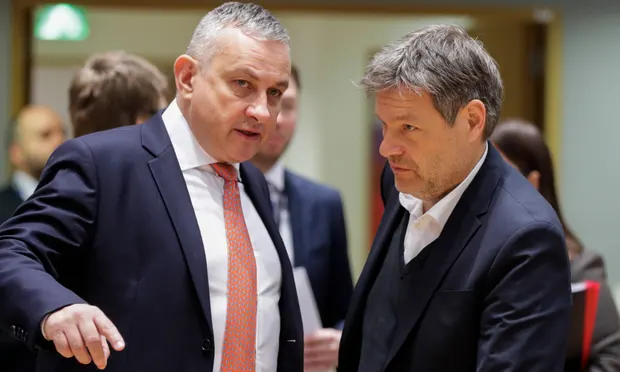
EU ministers have agreed a plan to cap the price of gas, ending months of argument over how to handle the cost of soaring energy prices after Russia cut gas supplies to Europe.
“Mission accomplished,” said the Czech minister for trade and industry, Jozef Síkela, who chaired talks between energy ministers, adding that negotiations had not been easy.
A gas price cap will kick in if prices on the main European gas exchange, the Dutch Title Transfer Facility (TTF), exceed €180 (£157) a megawatt-hour for three consecutive working days, far lower than the European Commission’s original proposal of €275 a MWh, which had been derided by cap-supporting countries as a joke.
Belgium, Spain and Poland had been leading the charge for a price cap below €200, amid surging energy prices.
However, in a concession to countries that feared energy suppliers would send their gas supplies to China or elsewhere when faced with a European price cap, another condition must also be met. The €180 cap will only be triggered when the TTF price is €35 higher than a global reference price for liquefied natural gas (LNG) for the same three successive working days.
This compromise persuaded Germany, the EU’s biggest gas consumer but a sceptic over price caps, to back the plans. Berlin was also won over by a change to a legal text on permits for new energy grids, rewritten with the aim of speeding up the deployment of renewable energy.
Other sceptics were not convinced, though: the Netherlands and Austria abstained, while Hungary voted against the plans.
Following the deal, Poland’s prime minister, Mateusz Morawiecki, tweeted: “This means the end of market manipulation by Russia and its company Gazprom.”
Síkela described the outcome as a “dynamic cap”, adding: “This proposal was never purely about the cap level; it was always about making sure that the mechanism would not jeopardise the security of supply or stability of the financial markets of the European Union.”
The EU energy commissioner, Kadri Simson, tweeted: “We now have an effective mechanism to prevent that #EU pays excessive high prices for gas that are not reflecting world prices.”
The cap can be triggered from 15 February 2023 and will apply for one year. Ministers also agreed that it could be switched off if the cap triggered risks to security of supply, financial stability or the “risks of increased gas demand”, according to a statement from the EU council of ministers.
The agreement came after Qatar warned that the EU’s response to a corruption scandal at the European parliament that has implicated Doha could “negatively affect” security and energy cooperation. However, a Qatari diplomat later walked back the threat, telling the Financial Times that the country was not threatening to cut LNG supplies to Europe.
Qatar has denied any involvement in the cash-for-influence scandal that has led Belgian police to charge four people with corruption, including a European parliament vice-president.
In the wake of Russia’s decision to cut gas supplies to Europe, the EU has been scrambling to find alternative energy suppliers, including in Qatar, the world’s largest exporter of LNG.
The Kremlin spokesperson, Dmitry Peskov, said the price cap was an attack on market pricing and unacceptable, Russia’s Interfax news agency reported.
… we have a small favour to ask. Millions are turning to the Guardian for open, independent, quality news every day, and readers in 180 countries around the world now support us financially.
We believe everyone deserves access to information that’s grounded in science and truth, and analysis rooted in authority and integrity. That’s why we made a different choice: to keep our reporting open for all readers, regardless of where they live or what they can afford to pay. This means more people can be better informed, united, and inspired to take meaningful action.
In these perilous times, a truth-seeking global news organisation like the Guardian is essential. We have no shareholders or billionaire owner, meaning our journalism is free from commercial and political influence – this makes us different. When it’s never been more important, our independence allows us to fearlessly investigate, challenge and expose those in power.
Source: https://www.theguardian.com/
